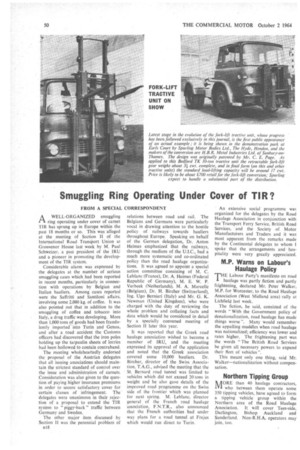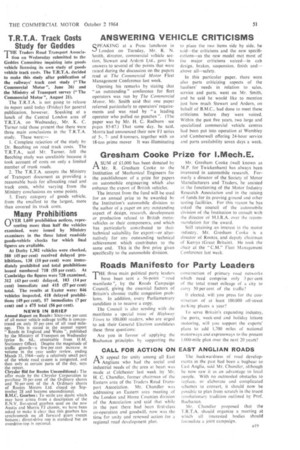Smuggling Ring Operating Under Cover of TIR?
Page 52

Page 53

If you've noticed an error in this article please click here to report it so we can fix it.
FROM A SPECIAL CORRESPONDENT
AA WELL-ORGANIZED smuggling ring operating under cover of carnet TIR has sprung up in Europe within the past 18 months or so. This was alleged at the meeting of Section II of the Intemationat Road Transport Union at Grosvenor House last week by M. Paul Schweizer, a past president of the [RU and a pioneer in promoting the development of the TIR system.
Considerable alarm was expressed by the delegates at the number of serious smuggling cases which had been reported in recent months, particularly in connection with operations by Belgian and Italian hauliers. Among cases reported were the Saffritti and Santiloni affairs. involving some 2,000 kg. of coffee. It was also pointed out that in addition to the smuggling of coffee and tobacco into Italy, a drug traffic was developing. More than 1,000 tons of goods had been fraudulently imported into Turin and Genoa, and after a road accident the Customs officers had discovered that the iron poles holding up the tarpaulin sheets of lorries had been hollowed to contain contraband.
The meeting wholeheartedly endorsed the proposal of the Austrian delegates that all issuing associations should maintain the strictest standard of control over the issue and administration of carnets. Consideration was also given to the question of paying higher insurance premiums in order to secure satisfactory cover for certain classes of infringement. The delegates were unanimous in their rejection of a proposal to extend the TIR system to " piggy-back " traffic between Germany and Sweden.
The other major item discussed by Section II was the perennial problem of n18 relations between road and rail. The Belgians and Germans were particularly vocal in drawing attention to the hostile policy of railways towards hauliers throughout Europe. Speaking on behalf of the German delegation, Dr. Anton Heimes emphasized that the railways, through the medium of the U.I.C., had a much more systematic and co-ordinated policy than the road haulage organizations. It was agreed to appoint a special action committee consisting of M. C. Leblanc (France), Dr. A. Heimes (Federal Republic of Germany), M. E. W. P. Verbeek (Netherlands), M. A. Marcelle (Belgium), Dr. H. Bircher (Switzerland), Mg. Ugo Bemieri (Italy) and Mr. G. K. Newman (United Kingdom), who were charged with the duty of reviewing the whole problem and collating facts and data which would be considered in detail by a specially convened meeting of Section II later this year.
It was reported that the Greek road haulage association wished to become a member of IRU, and the meeting expressed its approval of the application and noted that the Greek association covered some 10,000 hauliers, Dr. Bircher, director of the Swiss Association. T.A.G.. advised the meeting that the St. Bernard road tunnel was limited to vehicles which did not exceed 20 tons in weight and he also gave details of the improved road programme on the Swiss side of the frontier which was planned for next spring. M. Leblanc, director general of the French road haulage association, F.N.T.R., also announced that the French authorities had under way plans for a road tunnel at Frejus which would run direct to Turin. An extensive social programme was organized for the delegates by the Road Haulage Association in conjunction with the Transport Ferry Service, British Road Services, and the Society of Motor Manufacturers and Traders and it was most apparent from the remarks made by the Continental delegates to whom I spoke that the arrangements and hospitality were very greatly appreciated.
M.P. Warns on Labour's Haulage Policy
rE Labour Party's manifesto on road haulage was partly fiction and partly frightening, declared Mr. Peter Walker, M.P. for Worcester, to the Road Haulage Association (West Midland area) rally at Lichfield last week.
The fiction, he said, consisted of the words "With the Government policy of denationalization, road haulage has made things worse ". Many would remember the appalling muddles when road haulage was nationalized; efficiency was lower and rates higher. The frightening part was the words "The British Road Services be given all necessary powers to expand their fleet of vehicles".
This meant only one thing, said Mr. Walker—nationalization without compensation.
Northern Tipping Group
MORE than 40 haulage contractors, who between them operate some 350 tipping vehicles, have agreed to form a tipping vehicle group within the Northern area of the Road Haulage Association. It will cover Tees-side, Darlington, Bishop Auckland and Sunderland. Non-R.H.A. operators may join, too.
T.R.T.A. Track Costs Study for Geddes
T' Traders Road Transport Association on Wednesday submined to the
Geddes Committee inquiring into goods vehicle licensing its own study of goods vehicle track costs. The T.R.T.A. decided to make this study after publication of the railways' track cost study (" The Commercial Motor ", June 26) and the Ministry of Transport survey (" The Commercial Motor ", August 21).
The T.R.T.A. is not going to release its report until today (Friday) for general publication, however. Speaking at a lunch of the Central London area of T.R.T.A. on Wednesday, Mr. K. C. Turner told those present that there were three main conclusions in the T.R.T.A. study. These were: 1. Complete rejection of the study by Dr. Beeching on road track costs. The T.R.T.A., said Mr. Turner, felt the Beeching study was unreliable because it took account of costs on only a limited number of trunk roads.
2. The T.R.T.A. accepts the Ministry of Transport document as providing a reasonable basis for allocating road and track costs, whilst varying from the Ministry conclusions on some points.
3. Every category of goods vehicle, from the smallest to the largest, more than covered its track costs.
Many Prohibitions
OVER 1,600 prohibition notices, repreRenting more than half the vehicles
examined, were issued by Ministry examiners in the three latest roadside goods-vehicle checks for which final figures are available.
At Derby 1,302 vehicles were checked, 580 (45 per cent) received delayed prohibitions, 138 (10 per cent) were immediately prohibited and total prohibitions issued numbered 718 (55 per cent). At Cambridge the figures were 728 examined, 312 (43 per cent) delayed, 103 (14 per cent) immediate and 415 (57 per cent) total. The results at Exeter were: 846 vehicles inspected, 418 delayed prohibitions (49 per cent), 57 immediates (7 per cent) and a 475 total (56 per cent).
NEWS IN BRIEF Annual Report on Roads: Sixty-two per cent of all motor vehicle mileage traffic is concentrated on only 10 per cent of all road mileage. This is stated in the annual report "Roads in England and Wales " published by the Ministry of Transport on 'VVednesday (price 8s. 6d., obtainable from H.M. Stationery Office). Despite the magnitude of traffic growth—a five per cent increase in volume In the year under review, ending March 31, 1964—only a relatively small part of the whole road system is congested, and then only at certain parts of the day, says the report.
Chrysler Bid for Rootes Unconditional : The offer made by the Chrysler Corporation to purchase 30 per cent of the Ordinary shares and 50 per cent of the A Ordinary shares of Rootes Motors Ltd. closed on September 28 and became unconditional.
B.M.C. Gearbox: To settle any doubt which may have arisen from a description of the E.N.V. five-speed gearbox used on the new Austin and Morris FJ chassis, we have been asked to make it clear that this gearbox has synchromesh on all forward gears except bottom: direct-drive top is standard but an overdrive-top is optional.






























































































































































































































